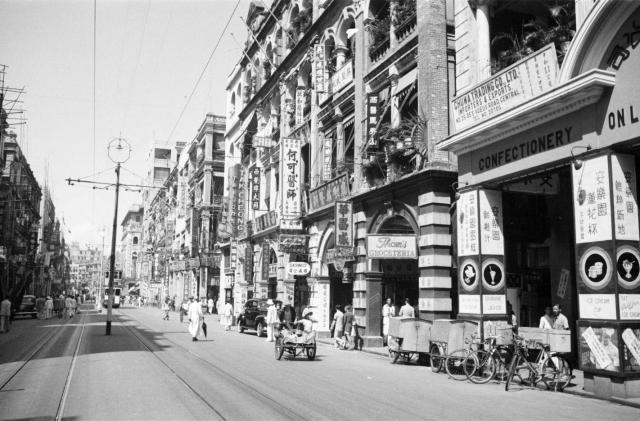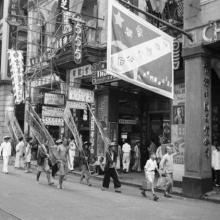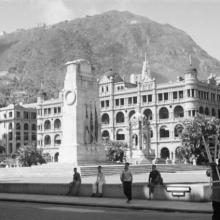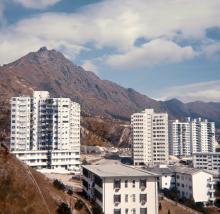View the original, larger copy of this image at the UWM website: http://collections.lib.uwm.edu/u?/agsphoto,18230
Des Voeux Road Central - On Lok Yuen
Primary tabs

Submitted by moddsey
Date picture taken (may be approximate):
Wednesday, January 1, 1941
Gallery:
Connections:
- Des Voeux Road Central - On Lok Yuen shows Place Central Fire Station [1926-1982]
- Des Voeux Road Central - On Lok Yuen shows Place #72 Des Voeux Road Central, Tak Wing Pawn Shop - Since 1940 [1940- ]
- Des Voeux Road Central - On Lok Yuen shows Place On Lok Yuen, Des Voeux Road [????-1959]
- Des Voeux Road Central - On Lok Yuen shows Place Salvation Army's Stanley Family Store [????- ]




Comments
Good view of On Lok Yuen on
Good view of On Lok Yuen on the right.
Were those bicycles & tricycles parked outside just for delivery, or did they also act as mobile sales, like a modern ice-cream van?
Regards, David
Comment edited on 17/10/2017
I just became aware of the latest response on this thread. Thank you Matt for bringing true information to the situation. The posts I made were written from short conversations with my grandfather, who is very old and whose recollections are probably hazy and inaccurate. My interpretation of the events may have taken the information further from the truth. Since the comment by Matt on 2017-07-31 has allowed me to ascertain that the opinions I have is erroneous, I shall retract every comment I have made on the subject of On Lok Yuen. True information on this subject should now be left to the people who have better information than I do. To the people that my posts have offended, I had no intention to cause any harm, and apologize for the damage it may have caused.
breskvar
re: Mobile sales
Thanks Breskvar,
Facts like those from people who were actually there are priceless. Do you know if they carried on in business through the wartime years?
And thanks to Moddsey for posting these photos.
Regards, David
Comment deleted
Comment deleted
re: Wartime Happenings
Thanks for following up on this Breskvar, very interesting to hear more of the story.
If your grandfather worked there throughout the Japanese occupation, I'm interested to hear where they got the ingredients from to run the restaurant. eg did the Dairy Farm keep producing dairy products during that time?
Regards, David
Comment deleted
Comment deleted
Westerners in Wartime
Not all westerners would have been interned, residents of neutral countries, (portugal, spain, switzerland etc) would not. as far as I know.
There's a comment in the war diaries about receiving food parcels from a portuguese lady.
Not sure what they would have done for a living.
Supplies & Westerners
Hi Breskvar,
Thanks for following up on this again. fascinating to hear how it kept running throughout.
As Alun mentions, there were several groups of western people that were not interned, whether for all or some of the occupation. As well as neutral countries, there were the axis countries that were allies with Japan. I imagine any nationals from those countries would have been in a relatively strong position, though I don't remember reading of any. Emily Hahn was an American author, who stayed out of camp til she left for America in 1943. Gingle was an American who started off in Stanley, then had several years out of camp, before ending the war interned in a different camp.
So there were a number of western people about, though not many "rich". It probably made them all the more unusual to see, which is why they'd stand out in your grandfather's memories.
Regards, David
I find the comments on this
I find the comments on this thread facsinating. It's great to get memories from people who actually lived through the occupation.
As Marlowe and David have pointed out, there were a fair number of uninterned Europeans: 1) Axis nationals - after the Italians switched sides most or all of the Italians were allowed to stay uninterned as they were priests or other religious, although the Germans were briefly held after the 1945 surrender. 2) Neutrals - Swiss and Portuguese seem to have been treated as neutrals at all times, while other nationalities varied - to take two examples, Belgian bankers were at first forced to live with the British and Americans at the Sun Wah Hotel, but then allowed to move out, while Russians are recorded in Stanley, Shamshuipo and 'free' in town. 3) Allied citizens allowed to stay 'out' for one reason or another. The two main groups of civilians were 'public health workers' at the French Hospital and the bankers. There were also about 60 military personnel at Bowen Road Hospital. My current estimate is that there were at least 200 in all categories - male/female, adult/children, ecclesiastical/secular, civilian/military. Further, it seems that even if you were an Allied citizen you might be allowed to choose between town and Stanley if you weren't 'pure white': http://gwulo.com/node/14063
How they lived is also an interesting question. It seems that most people, including the Japanese, ate from ration cards which varied according to nationality. If you could earn money or had things to sell you could supplement what you were given by buying from the shops. Some people preferred to go into Stanley as they thought they'd be safer and more likely to be fed there.
Oner more point: most of the Dairy Farm herd were quickly shipped to Japan, but some animals remained and three or so British nationals, including the company vet, were kept 'out' at Pokfulam to care for them.
Comment deleted
Comment deleted
Hi David,
Hi David,
I commend you for such a wonderful and meaningful site. My only regret is not having come across it earlier!
Breskvar,
I couldn't help but read in depth your comments. I'd really love to hear more! I'm still new to the site and it seems I might be a bit late getting in on this conversation string..
Anyways, I would love to hear back from you both!
Thanks
Hi Kay,
Hi Kay,
Glad to hear you're enjoying the site. If you can add anything to this thread or any of the pages on this site, please go ahead and join in.
Is there any part of Hong Kong's history you're specially interested in?
Regards, David
Breskvar,
Breskvar,
I'm afraid the conversation thread stagnated a bit again. In either case, I was really hoping to get in touch with you. Reading the comments you wrote, I can't help but want to speak with and hear more from both yourself and your grandfather. Your grandfather must have a wealth of information. I, too, am very intrigued with On Lok Yuen's history as I have deep roots and connections with its staff (and founders) as well. I'd love to exchange stories and pictures.
Karen
Hi David,
Hi David,
Sorry for the delayed reply. To be honest, I'm particularly fond of and interested in the history of On Lok Yuen. I may be able to provide some insight into this part of HK history. I'm still learning how best to navigate your site, but I most certainly would have some pictures and stories to share with others on here, too.
More On Lok Yuen history
Hi Karen,
Yes please, we'll enjoy seeing any stories and pictures you can share. Here's how to upload a photo: http://gwulo.com/node/2076
Regards, David
Comment deleted
Comment deleted
On Lok Yuen Restaurants and Ice Cream